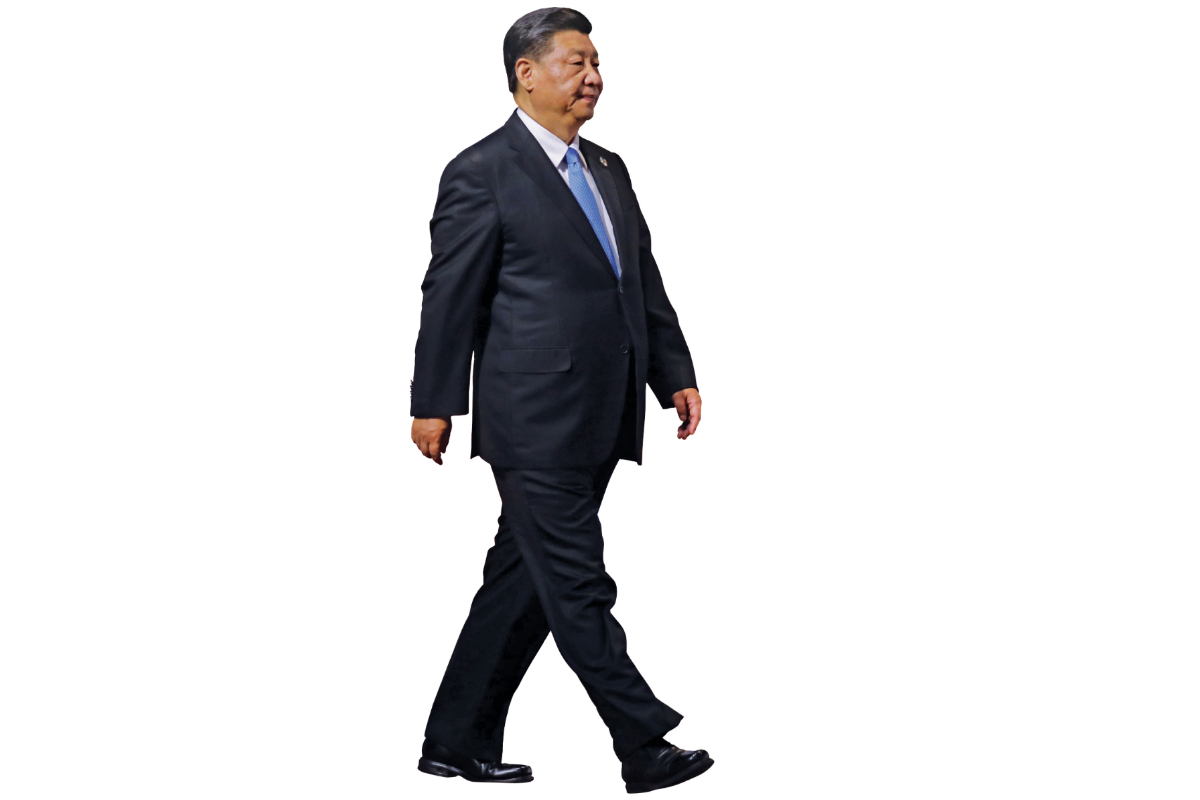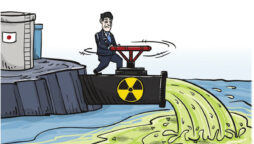
Striding on Growth Path

Xi wins third term and leads China on new journey
The Communist Party of China should always act for the people and rely on the people on the new journey of national rejuvenation through a Chinese path to modernisation, said Xi Jinping, 69 after he was elected general secretary of the 20th Central Committee of the CPC and to lead the country for the third time.
The Party will not be daunted by high winds, choppy waters or even dangerous storms, as the people will always offer their firmest support and give it confidence, Xi said, as he presented the CPC’s new top leadership when meeting with representatives of Chinese and international media on October 23 at the Great Hall of the People in Beijing.
“Taking their priorities as ours and acting on their wishes, we will continue the hard work to turn their aspiration for a better life into a reality,” Xi said.
Just as China cannot develop in isolation from the world, the world needs China for its development, he said.
Noting that the Chinese economy has great resilience and potential, Xi said that its strong fundamentals will not change, and it will remain on the positive trajectory over the long run. He said that through over 40 years of relentless reform and opening-up, China has created the twin miracles of fast economic growth and long-term social stability.
He added that the Party should always press forward with self-reform on the journey ahead, saying that a political party can only become invincible if it remains committed to self-reform, even though it has had a glorious past.
The revolutionary travails and tempering of the past century, and especially of the first decade of the new era, have made the CPC stronger and more dynamic, Xi said. “We must make sure that our century-old Party, the biggest in the world, will become ever more vigorous through self-reform and continue to be the strong backbone that the Chinese people can lean on at all times,” Xi added. He also expressed China’s commitment to further promoting the building of a human community with a shared future.
“We will work with peoples of all other countries to champion humanity’s shared values of peace, development, fairness, justice, democracy, and freedom to safeguard global peace and promote global development, and keep promoting the building of a human community with a shared future,” Xi said.
Stressing that the world is grappling with unprecedented challenges, Xi said the CPC has consistently called on the people of the world to grasp and shape the future and destiny of humanity. “When all countries pursue the cause of common good, we can live in harmony, engage in cooperation for mutual benefit and join hands to create a brighter future for the world,” he added.
Xi’s remarks came shortly after the first plenary session of the 20th CPC Central Committee, which was elected on October 22 at the end of the weeklong 20th CPC National Congress.
At the plenary session, which was attended by 203 members and 168 alternate members of the CPC Central Committee, members of the Standing Committee of the Political Bureau of the CPC Central Committee, the Party’s top leadership, were elected.
A decade of severe challenge
In 2012, after assuming the Party’s top job, Xi said that he and his colleagues would lead the CPC in striving for national rejuvenation, pursuing a better life for the people, and addressing problems within the Party.
In the past decade, China under his leadership has witnessed historic changes, with its economy more than doubling to 114 trillion yuan ($16 trillion), absolute poverty wiped out and moderate prosperity attained for the country’s 1.4 billion people. It was also a decade of severe challenges. The Covid-19 pandemic, a trade war with the United States and the downward pressure on the economy all posed hurdles for China’s development and tested the strength of Xi and the Party he leads.
Bringing about milestone transformations and ushering in a “new era” for socialism with Chinese characteristics, Xi is regarded as the helmsman capable of leading the country in overcoming difficulties and pursuing full modernisation.
Son of Loess Plateau
Xi Jinping was born in June 1953 into a revolutionary family. His father, Xi Zhongxun, was a revered CPC leader. Describing his father as “someone who had devoted himself wholeheartedly to the Chinese people,” Xi Jinping said he was greatly inspired by the elder Xi and had pledged to follow in his footsteps.
At 15, as an “educated youth,” Xi left Beijing for a village called Liangjiahe in an arid part of northwest China’s Shaanxi Province, carrying with him a small sewing bag embroidered with Chinese characters “mom’s heart” by his mother Qi Xin. He later spend seven years in the countryside, working and living alongside farmers. He called himself a farmer when he recalled his Liangjiahe years. He was separated from his family, slept in cave dwellings, suffered from flea bites, and worked as hard as fellow villagers to tend crops, herd sheep, carry manure and haul coal.
He joined the CPC there and later became the village Party chief — the beginning of his political career. Xi recalled his earnest wish then was “to make it possible for the villagers to have meat and have it often.” He led them to dig wells, build dams, terrace hills and set up the province’s first methane-generating pit.
Xi said he gained his understanding of the meaning of the word “people” through his experience in Liangjiahe, and it strengthened his determination to “serve the people” — a principle he has adhered to over the decades.
In the late 1970s, after graduating from Tsinghua University, Xi served as a secretary to the minister of defence. In 1982, he volunteered to work at the grassroots level and moved to Zhengding, a poor county in north China’s Hebei Province. Peng Liyuan, his wife, later said that many of Xi’s classmates went abroad and he could have just done the same. But Xi stayed and chose a much harder path — to be a servant to the people.
In his three years in Zhengding, where Xi served as deputy Party chief and then Party chief, Xi rode bicycles to all the communes and production teams of the county to inspect work. Sometimes, he arrived when villagers were tilling the fields. He would join them and do the farm work.
Then he spent over 17 years in Fujian Province and nearly five years in Zhejiang Province. He served multiple roles in the two coastal provinces including vice mayor, prefecture Party chief, municipal Party chief, provincial governor and provincial Party chief.
In 2007, he worked in Shanghai as its Party chief before ascending to the Standing Committee of the Political Bureau of the CPC Central Committee.
Bond with people
Xi kept a close bond with the people wherever he worked, even after he was promoted to work at the apex of the Party. Xi has made it a tradition to visit the homes of the people ahead of every Spring Festival. Xi’s early-year experience of hunger and toiling on the farms may help explain why he would check the kitchen, bathroom and cellar in ordinary people’s homes.
He also kept the habit of exchanging correspondence with the people. Those who received Xi’s letters include farmers, entrepreneurs, pupils, grassland art troupe members, and soldiers guarding the borders.
In 2013, Xi initiated a “targeted poverty alleviation” drive and made plans for its implementation. Altogether, over 255,000 work teams and more than 3 million cadres were sent to the countryside to help villagers shake off poverty household by household. About 100 million people were lifted out of extreme poverty in the past decade.
Xi is very familiar with the plight of the nation after the Opium Wars brought by Western colonialists in the 19th century. In 2018, he visited the ruins of a cannon fort on Liugong Island in east China’s Shandong Province. More than a century ago, the island bore witness to the crushing defeat of China’s first modern navy in the First Sino-Japanese War. Xi paused for thought at the ruins, and inside the museum for the war he read out a patriotic poem deploring the foreign invasion at the time.
As the first CPC chief born after the founding of the People’s Republic of China in 1949, Xi shared pride in a string of achievements that manifested “the Chinese people have stood up”: the victory in the War to Resist US Aggression and Aid Korea, the establishment of a relatively complete industrial system, and the manufacture of nuclear bombs and satellites. He commended the achievements. “Only socialism could save China; only socialism could develop China,” he said.
Long-term vision
Xi took the lead in boosting foreign trade and investment, as well as the common development of both public and private businesses. As the Party’s top leader, Xi convened a high-profile meeting of private businesses.
Xi is regarded by his comrades, both at local and central levels, as being good at long-term planning.
In 2020, his strategic planning was manifested in mapping out the country’s 14th Five-Year Plan and long-term objectives through 2035.
To make a good plan, Xi chaired meetings to listen to the views and opinions of experts, business people, scientists and grassroots cadres. He instructed carrying out online suggestion collection. Chinese internet users gave over 1 million comments. Xi inherited a mission to achieve China’s modernity, which had been dreamed of and fought for by generations of Chinese people.
Fight against corruption
People expected him to bring real changes. And changes must begin from the Party itself. Xi said it takes a good blacksmith to forge good steel, calling for the self-reform of the Party and “full and rigorous” self-governance. He unleashed the largest anti-corruption campaign in the Party’s history. “We must do the things that need to be done … If we let a few hundred corrupt officials slip through the cracks, we would let down all 1.3 billion Chinese people,” Xi said.
In early 2022, Xi declared that an overwhelming victory had been achieved in the fight against corruption, and the victory has been consolidated across the board. Xi wants to ensure that the CPC’s over 96 million members and 4.9 million primary-level organisations maintain their purity and strength. Xi considers the Party’s overall leadership the key to building China into a great modern socialist country.
Development philosophy
Xi led the formulation of the game-changing eight-point decision on improving work conduct. He ordered leading officials to regularly report their personal and family matters such as marriage status, personal finances and business involvement. The Party regulated the business involvement of the spouses, children and children’s spouses of over 4,700 officials between 2015 and 2021.
Xi led the efforts to promulgate and revise a series of Party regulations, improve the mechanism to conduct discipline inspections, and establish the National Commission of Supervision that places everyone in public office under oversight.
Xi called on the public to respect and learn from heroes. A national law on respecting heroes was promulgated. A sound system of granting awards and honors was set up. Xi also put forward a set of core socialist values, the essence of which, he said, is patriotism.
The law-based governance in all fields Xi advances is considered a profound revolution in governance. The rule of law for the country, the government, and society must be comprehensively in place by 2035, according to Xi.
He is the first Chinese president to swear allegiance before the country’s Constitution. Xi said the Constitution enjoys supreme legal status, authority and force. He led the efforts to streamline government and reduce taxes and fees for enterprises.
Xi has put forward a new development philosophy that promotes innovative, coordinated, green, open and inclusive development for all.
Economic growth
Xi often went to companies, factories, shops and stalls to feel the pulse of economic activity. On a visit to a carmaker workshop, he got into a China-made sedan for first-hand experience.
Under his leadership, China has consolidated its position as the world’s second-largest economy. In the past decade, the share of China’s GDP in the global economy grew from 11.3 per cent to 18.5 per cent. On average, the Chinese economy contributed more than 30 per cent of global economic growth in recent years. It was the first major economy to register growth after the Covid-19 pandemic wreaked havoc around the world.
In 2021, China’s foreign trade exceeded $6 trillion. Its trade with the United States grew by nearly 30 per cent and amounted to $755.6 billion. He chaired group study sessions of the Party leadership and invited experts to brief him and his colleagues on artificial intelligence, big data, quantum technology and blockchains. He visited satellite launching sites, chip labs and high-speed train workshops to learn the latest sci-tech development.
China’s ranking in the Global Innovation Index, released by the World Intellectual Property Organisation, rose from 34th place in 2012 to 11th place in 2022. Between 2012 and 2021, China’s research and development spending increased from 1 trillion yuan to 2.8 trillion yuan. It now ranks second in the world.
Top security system
China has established the world’s largest social security system, with 1.04 billion people covered by basic old-age insurance and 95 per cent of the population covered by basic medical insurance. Fiscal spending on education accounted for over 4 per cent of GDP for 10 years in a row. China has also introduced the three-child policy, and rolled out measures to reduce homework and after-school tutoring burdens on students.
Xi has placed common prosperity on agenda. He said this is the essential requirement of socialism. Xi’s common prosperity drive aims to narrow the rich-poor gap, address the regional and industrial disparity, and improve both the material and cultural-ethical life of the people, thus achieving balanced development and social equality.
As the top commander, Xi reviewed armed forces at grand parades five times, two of which were organised in the sea. Over the past decade, China unveiled two homegrown aircraft carriers. The fifth-generation stealth fighter aircraft, J-20, was commissioned. China also took the lead in hypersonic weapon research. The Chinese military today has the determination and ability to safeguard China’s sovereignty, unification and territorial integrity, to provide strategic support for national rejuvenation, and to make even greater contributions to world peace and development, according to Xi.
In October 2017, Xi Jinping Thought on Socialism with Chinese Characteristics for a New Era was officially instituted at the 19th CPC National Congress as a guiding principle. The thought was enshrined in the CPC Constitution and China’s Constitution.
A tough man with tender heart
Xi has a strong track record as a crisis manager. Battle-hardened by years of handling tough situations, Xi has the experience, courage and tenacity needed to cope with the tests and challenges China faces today.
While working in the coastal regions of Fujian, Zhejiang and Shanghai, Xi led local response efforts to multiple powerful typhoons. During these instances, he would spend whole nights overseeing the evacuation in an effort to minimise casualties and damage.
When he served as vice president of China, Xi oversaw the preparations for Beijing 2008 Olympics and Paralympics, which were made under tremendous pressure in a year overshadowed by the devastating Wenchuan earthquake and the riots in Lhasa.
At a hospital specially built for treating Covid-19 patients, he spoke to a patient via video link, voicing his encouragement. On March 10, 2020, Xi visited Wuhan to inspect Covid-19 prevention and control on the front line.
Foreign relationships
Handling China-US relations was one of Xi’s priorities in the past decade. When the United States initiated a trade war against China, he devised the strategy that China does not want a trade war but is not afraid of one and will fight one if necessary.
In his meetings with former US President Donald Trump and incumbent President Joe Biden, Xi said that China and the United States should not fall into a so-called trap of conflict and confrontation, and cooperation is the best option; and that the two countries should respect each other, coexist in peace, and pursue win-win cooperation.
During a visit to Italy in 2019, asked about how he felt about being Chinese president, Xi told Roberto Fico, then the president of the Italian Chamber of Deputies, that governing such a huge country requires a strong sense of responsibility and hard work.
He wrote letters replying to American people, including young students. He hoped that the students would become young ambassadors for the friendship between the Chinese and American peoples. He likes making friends with intellectuals, writers and artists.
Xi is an avid sports fan. He enjoys football, ice hockey, boxing and swimming, often taking time out of his busy schedule to swim. He uses sports to learn how to deal with challenges.
Xi has visited the United States eight times. He was the first Chinese leader to watch an NBA game in a US arena.
When visiting Cuba, he paid a special visit to the breakwater in Cojimar where Hemingway wrote “The Old Man and the Sea,” and dropped by the bar Hemingway frequented to order a mojito. He said he wanted to feel for himself what was on the American writer’s mind and what the place was like when he wrote those stories.
Xi and Russian President Vladimir Putin have had approximately 40 meetings since 2013, charting the course of bilateral ties.
China and Russia have forged a comprehensive strategic partnership of coordination for a new era. Bilateral trade has increased from $88.1 billion in 2012 to $146.8 billion in 2021. The two countries have cooperated on major energy projects such as the eastern route of the China-Russia natural gas pipeline. They have also launched cooperation in such frontier fields as the International Lunar Research Station project.
China has more neighbours than any other country in the world, and Xi has visited almost all of these neighboring countries. He has stressed the principles of amity, sincerity, mutual benefit and inclusiveness in forging friendships with China’s neighbours.
He also actively promoted the settlement of regional flash points such as the Palestine-Israel conflict and the situation on the Korean Peninsula.
Xi has proposed a series of measures, including a “two systems” solution to the Taiwan question, to “maintain the initiative and the ability to steer in cross-Strait relations.”
Striving for a better world
As a young man, Xi was already fascinated by the rich diversity of the world. In rural Shaanxi, he devoured literary classics of the world, such as Faust and William Shakespeare’s plays.
He read Das Kapital three times; his reflections on the book filled 18 notebooks. “Marxism, though wide-ranging and profound, can be summed up in a sentence — the pursuit of the emancipation of humankind,” he later observed.
Xi appreciates the diversity of civilisation. “There will be no human civilisation without diversity,” he said.
Championing the shared human values of peace, development, fairness, justice, democracy and freedom, Xi proposed the Global Development Initiative and the Global Security Initiative. The two initiatives call for more cooperation in areas such as poverty reduction, climate change, food security and green development, receiving positive responses from more than 100 countries.
By 2035, China will have basically achieved modernisation. This will mark the first time in human history that an entire population of over 1 billion people achieve modernisation as a whole. The great achievements China has made in the process of world modernization represent the greatest contribution made by the CPC to the cause of human progress.
A new journey has begun. Xi will lead China to pursue national rejuvenation by following the uniquely Chinese path to modernisation, and to continue striving for a shared future for humanity.
“The journey ahead is long and arduous, but with determined steps, we will reach our destination,” Xi said.
Courtesy: China Daily and Xinhua
Catch all the The Globe News, Breaking News Event and Latest News Updates on The BOL News
Download The BOL News App to get the Daily News Update & Live News.











 Read the complete story text.
Read the complete story text. Listen to audio of the story.
Listen to audio of the story.